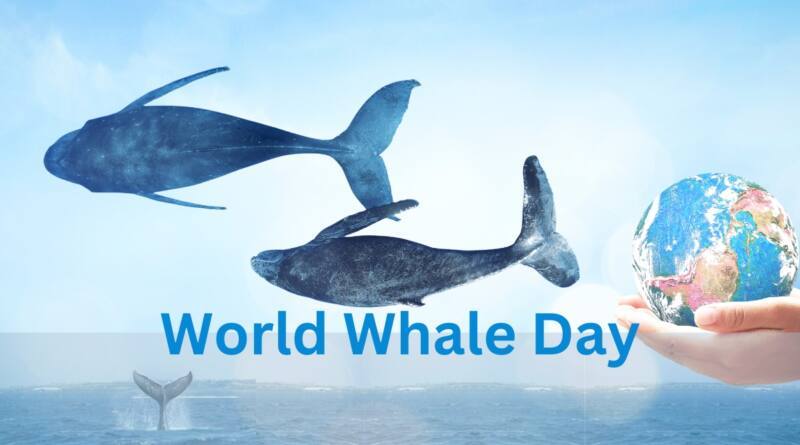World Whale Day: Focus On The Most Endangered Species
World Whale Day is a worldwide celebration of one of the most magnificent creatures of the sea. While we recognise whales’ cultural and ecological importance, we also highlight the numerous threats these animals face, ranging from ocean pollution to entanglement in fishing gear. This article examines the most recent research on whale conservation efforts, as well as the successes and challenges associated with protecting these endangered species. Join the conversation on social media using the hashtag #WorldWhaleDay to learn how you can help whale conservation efforts.
World Whale Day is observed annually on February 19 and is intended to increase public awareness of these magnificent marine mammals and the problems they face.
Whales are among the most amazing animals on the earth, from the humpback whales that travel hundreds of kilometres each year to the orcas who prowl the oceans in quest of prey. Since ancient times, they have captured people’s attention and inspired works of music, literature, and art.
Whales are important to culture, but they have also long been the focus of commercial whaling, which has driven numerous populations to the verge of extinction.
Many activists feel that some governments’ continued whale hunting under the pretence of scientific research is really a cover for ongoing commercial whaling, despite the fact that the majority of nations have officially outlawed the practise.
Whales are also threatened by a variety of other factors, such as ocean pollution, climate change, and the effects of human activities like shipping and fishing. Whales are losing their habitats and failing to find enough food to thrive as the oceans become warmer and more acidic.
There is yet hope for the whales of the planet despite these difficulties. A few populations of whales have started to recover as a result of the efforts of numerous conservation organisations and governments over the past few decades. Whale watching has in certain places developed into a significant source of income for coastal towns, creating a financial incentive to save these species.
People all over the world are taking action to safeguard whales and their habitats in observance of World Whale Day. There are various ways to get involved and make a difference, from beach cleanups to educational activities. You can contribute to making sure that whales survive for many years, whether you live close to the shore or thousands of kilometres from the nearest ocean.
24 of the 90 species of whales, dolphins, and porpoises, according to the International Union for Conservation of Nature (IUCN), are deemed threatened or endangered. The vaquita, the Maui’s dolphin, and the North Atlantic right whale are a few of the most endangered species.
Entanglement with fishing gear is one of the main dangers to these creatures. One of the most endangered whale species in the world, the North Atlantic right whale, suffered from entanglement in fishing gear 85 times between 2000 and 2018, according to a report by the National Oceanic and Atmospheric Administration (NOAA).
Ocean noise pollution is a significant danger to whale populations. Larger and more numerous ships generate greater underwater noise, which can disrupt whales’ activity and communication. The amount of habitat that some whale species have access to can be reduced by as much as 80%, according to a study that was published in the journal Nature. Low-frequency noise from ships can travel for thousands of kilometres.
Whales are under severe threat from climate change. Whales’ habitats and food supplies are changing significantly due to rising ocean temperatures and acidity. For instance, a research in the journal Global Change Biology discovered that humpback whales’ habitat in the North Pacific is shifting northward due to increasing sea temperatures, perhaps resulting in a decrease in their food supply.
Positively, recent efforts to conserve whales have shown some success. The International Whaling Commission reported in 2020 that because to decades of protection and conservation measures, the humpback whale population in the South Atlantic has recovered from the brink of extinction to an estimated 25,000 individuals.
Let’s keep in mind the magnificence of these animals and the significance of safeguarding them as we observe World Whale Day. Let’s do something to make sure that these wonderful creatures can continue to call our oceans home and that future generations can continue to be in awe of their beauty.
Sources:
- International Union for Conservation of Nature. (2021). Red List of Threatened Species.
- National Oceanic and Atmospheric Administration. (2020). North Atlantic Right Whale – Conservation and Management.
- Ainslie, M. A., et al. (2018). Shipping noise affecting marine mammals: Data sources, effects on marine species, and mitigation strategies. Frontiers in Marine Science, 5, 255.
- Stafford, K. M., et al. (2018). Changes in distribution and vocal behavior of North Pacific humpback whales in response to an ecosystem regime shift. Global Change Biology, 24(3), e987-e999.
- International Whaling Commission. (2020). South Atlantic humpback whales no longer critically endangered.
#WorldWhaleDay
#WhaleConservation
#EndangeredSpecies
#HumpbackWhales
#OceanPollution
#FishingGearEntanglement
#ClimateChange
#MarineMammals
#ConservationEfforts




